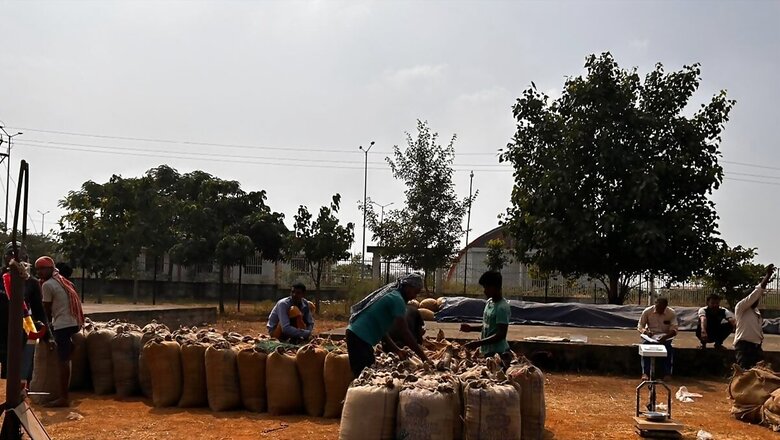
views
Farmers in some parts of north India are agitating to make the minimum support price (MSP) a legal right. Quite expectedly, politicians, intellectuals, activists, farm leaders, etc., are arguing about the merits of the demand. All of them refuse to answer, or ever ask, the fundamental question: should there be any MSP for farmers in the first place? I am quite sure they would call this a phoney question or a non-question.
First and foremost, we find the answer to the fundamental question. For this, we just have to look at the myriad things around us—homes, electrical appliances, furniture, electronic devices, garments, footwear, automobiles, items in the kitchen, toiletries, and so on. Where did all these come from? Who makes them? Who runs them? Who repairs them? Thousands of goods and services are needed to make and run them and thousands of professions are involved.
Millions of people are engaged in these professions. How many of them get an assurance like the MSP? From the big corporations that set up factories to manufacture steel and automobiles to the humble hawker selling fast food, no one gets an assurance that their wares will be bought by the government at MSP. Business tycoons and corporate bosses can fend for themselves if they are unable to sell their goods and services, but what about the roadside mechanic, the plumber, and the pakoda seller? Do they get underwritten by the government in any eventuality? The answer is a big ‘no’.
But our perverted public discourse has programmed our minds to such an extent that we don’t question the morality and rationality of giving MSP to farmers. The perversion has afflicted everything—politics, economy, public life, even language. The farmer is glorified as the annadata, translated as lord or even god. As I wrote in my earlier piece, “We abuse language, and then language abuses us, imposing a heavy cost on us. Political and intellectual elites abuse language all the time; all of us pay the price.”
It is obvious that there is no moral and rational justification for giving MSP to farmers. The only reason there’s an MSP phenomenon is that politicians find it easy; it is more convenient to offer a palliative than to address the real issues that plague agriculture. But an easy solution is not always the correct solution—certainly not in this case.
The MSP has proved to be a bane for not just the taxpayer but also for the intended beneficiaries—farmers. It is a well-known and documented fact that the MSP is among the factors responsible for the distortion of cropping patterns. Farmers tend to grow the crops that get them higher MSP, thus ignoring the ones best suited for the soil. Quite apart from leading to the overproduction of certain crops like wheat and rice, this also distorts the market and adversely affects the agricultural ecosystem. Besides, MSP benefits only a handful of farmers, those who grow crops like wheat, rice, and sugarcane; they also happen to be among the most prosperous farmers. Making MSP a legal right will help these farmers at the expense of the public exchequer—with little gain for the smaller peasants.
It may be mentioned here that the demand of the agitating farmers is to make the MSPs of 23 crops a legal right. As Ashok Gulati, one of the country’s top agricultural economists, recently told a news channel, these 23 crops constitute just 28 per cent of the total agricultural produce. At any rate, MSP has been a boon for a very small portion of farmers, and that too mostly in Punjab, Haryana, and western Uttar Pradesh. Gulati, who headed the Commission for Agricultural Costs and Prices (2011-14), had earlier said that just 6 per cent of farmers were beneficiaries of MSP.
It is quite evident that MSP has increased regional disparities, for its benefits are not uniform across the country. According to Gulati, paddy and wheat are brought from eastern Uttar Pradesh and Bihar and sold in Punjab. The reason is that market prices in the two states are 15-25 per cent lower than the MSP in Punjab. With the government buying certain commodities at prices higher than the ones prevailing in the market, the private sector is discouraged from investing in agriculture, thus impeding growth and development in the sector.
Then there is also the issue of MSP fueling inflation. In August last year, key Central government ministries and departments had expressed concern over the hike proposed in the MSP for kharif crops in the 2023-24 season by the Union Ministry of Agriculture & Farmers’ Welfare.
Agriculture is a sector that has been ailing for quite some time; it is evident from the fact that while it employs more than half of the workforce, its contribution to GDP is less than one-fifth of the total. The way out is a strong dose of reforms. The Narendra Modi government tried to do that in 2020, but the vocal and prosperous farm lobby of northern states launched an agitation and torpedoed the laws that were aimed to revolutionise the sector. The same people now want to further strangle the sector by demanding that the MSP be made a legal right.
The author is a freelance journalist. Views expressed in the above piece are personal and solely those of the writer. They do not necessarily reflect News18’s views.




















Comments
0 comment